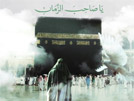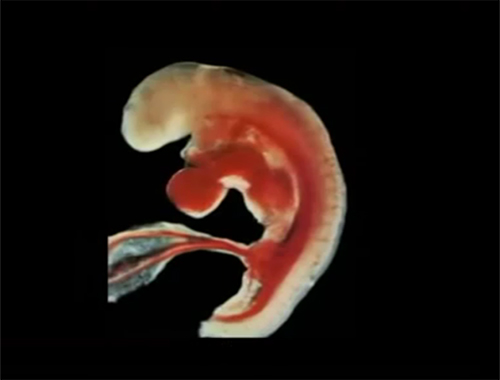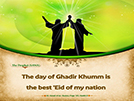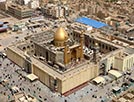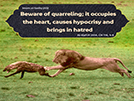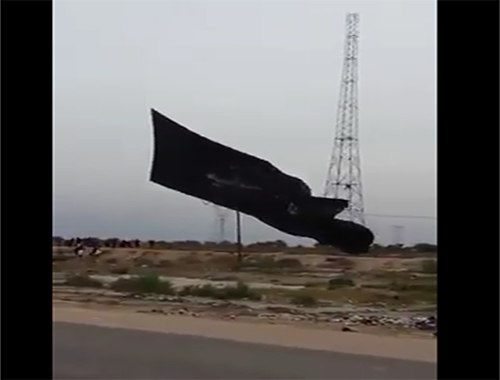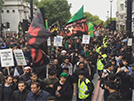Imam Reza (AS) Answers Al-Ma'mun
- Details
- Hits: 15004
.jpg)
Imam Reza (AS) Answers Al-Ma'mun
Al-Ma'mun (The Abbasid caliph) sent Al-Fazl-bin-Sahl, his vizier, to summon Imam Reza(AS). When the Holy Imam attended, the caliph said, "I would like you to summarize for me the legal and the illegal matters in addition to the obligatory and the recommendable practices of Islam, for you are certainly the argument of Allah against His creatures and the core of knowledge." Imam Reza (AS) agreed and asked for an inkwell and a paper. He then asked Al-Fazl to write down.
In the Name of Allah, The Beneficent, The Merciful
We are sufficed with the confession that there is no god but Allah the One the absolute Who did not have a wife or a son. He is Self-existent, All-hearing, All-seeing, Almighty, All-existing, Everlasting, Light, All-knowing Who is not ignorant, All-powerful Who is not incapable, All-sufficient Who needs no one, and All-just Who does not wrong anyone. He created everything. Nothing is like Him. There is no one match, opponent, opposite, or equal to Him.
I declare that Mohammed (p.b.u.h) is His servant, messenger, trusty, and choice among the creatures. He is the master of the messengers, "the Seal of the Prophets", and the best in the words. There is no prophet after him and there is no conversion or change to his religion. I declare that everything with which Mohammed (p.b.u.h) came is the evident right. We believe in him as well as all the messengers, prophets, and evidences of Allah that preceded him.
We believe in his truthful Book that "falsehood can not reach it from any direction. It is the revelation from the All-wise, praiseworthy One. (Holy Qu'ran 41:42) We also believe that his Book is the prevalent over all the (heavenly) Books and that it is all right from its beginning up to its end. We believe in its decisive (Verses), allegorical, particular, general, promise, threat, repealing, repealed, and news. No creature can ever bring its equivalent.
We declare that the evidence and argument on the believers after the Holy Prophet(p.b.u.h), the manager of the Muslims' affairs, the spokesman of the Holy Quran, and the knowledgeable of its rulings is his brother, successor, and trustee whose relation to him is as same as Aaron's relation to Moses; Ali-bin-Abi Talib(AS). He is the commander of the faithful believers, the Imam of the God-fearing, the leader of the white-fore headed honorable, the doyen (head) of the believers, and the best of the successors of the prophets. After him come Al-Hasan(AS) and Al-Hussein(AS) successively up to now.
They are the Prophet's progeny, the most knowledgeable with the Book (Of Allah) and the Sunnah, the fairest in issues, the most favorable for leadership in every time, the firmest handle, the imams of right guidance, and the argument against people of this world until Allah seizes the earth and those living in it. He is surely the best of the seizers.
We believe that anyone who opposes them (the Imams) is deviant, misleading, and deserter of the right and the guidance. They (the Imams) are the interpreters of the Holy Quran and the spokespersons of the Holy Prophet with directness. He whoever dies before he acknowledge and follows them by names is regarded as one of those who died before Islam.
Piety, chastity, honesty. goodness, diligence, keeping the deposit of the pious and the sinful, lengthy prostration (to Allah), night worship, avoidance of the forbidden acts, expectation of the relief by means of patience, good companionship, good neighborhood, doing favours limitlessly, abstinence from injury, and treating the believers with happy mien, advice, and mercy-all these are among the features of the Imams' religion.
The ritual ablution - as Allah instructed in His Book - is washing the face and the hands and passing water over the head and the feet. To do each action one time is the obligatory, and to do each action twice is recommendable. Any addition is a rewardless sin.
Invalidators of the ablution are fart, urination, excretion, sleep, and ceremonial impurity.
Anyone who passes water over the slippers (in the ritual ablution) is opposing Allah, His messenger, and His Book. Besides, his ablution will be invalid.
When Omar heard that Imam Ali(AS) opposes people who used to pass water over their slippers, he said to him, 'I saw the Holy Prophet(p.b.u.h) pass water over the slippers.' 'Was it that before or after the revelation of Sura of Al-Ma'ida?' asked Imam Ali(AS). 'I do not know,' answered Omar. Then Imam Ali(AS) said, 'I am sure that the Holy Prophet(p.b.u.h) did not pass water over the slippers since the revelation of Sura of Al-Ma'ida'.
Bathing after the ceremonial impurity, wet dreams, and menstruation, in addition to the bathing of those who wash the dead, are obligatory.
Friday bathing, the two eids bathing, bathing before arrival in Mecca and Medina, bathing of the umrah, bathing of ihram, bathing of Arafah Day, and bathing on first, nineteenth, twenty-first, and twenty-third of Ramadan -all these bathing are recommendable.
The obligatory prayers are as follows:
The Dhuhr Prayer is four rak'as, the Asr Prayer is four rak'as, the Maghrib Prayer is three rak'as, the Esha' Prayer is four rak'as, and the Fajr Prayer is two rak'as. These are seventeen obligatory rak'as. The recommendable rak'as are thirty-four. Eight rak'as are performed before the Dhuhr Prayer, eight are performed after it, four are performed after the Maghrib Prayer, two (although considered as one) are performed-while sitting- after the Esha' Prayer, and eight are performed after midnight. Witr prayer is three rak'as followed by two.
The prayers should be performed as soon as their times fall. Every single rak'as that is performed collectively is equal to two thousand rak'as that are performed individually. Do not follow a sinful imam (of a collective prayer). Follow - in the collective prayers only those who believe in the Wilayah . Do not offer the prayers while you are wearing skins of dead animals or beasts.
Shortening the prayers is valid after a traveler is four farsakhs(*) away from his home country -four bareeds (*) back and four forth. When prayers are shortened, fasting should be broken. Qunut is in four prayers - the Dhuhr Prayer, the Maghrib and Esha' Prayers, the Friday prayer, and the Asr Prayer. Qunuts are performed before raku' after qira'a.
* Farsakh is usually reckoned as equal to between 3 and 312 miles (5 to 512 km). One bareed equals 12 miles (4 Farsakhs).
The funeral Prayer is five takbirs. It is empty of taslim because taslim is performed only when there is ruku' and sujoud (*), and the Funeral Prayer has no ruku' or sujoud. The graves should be squared, not humped. Voices should be raised when 'bismillahir rahmanir rahim - in the Name of Allah, the Beneficent the Merciful-' is recited with Sura of Fatihah.
* Ruku': The obligatory genuflection in the prayer.
* Sujoud: The obligatory prostration of the prayers.
The obligatory zakat is five (silver) dirhams for each two hundred dirhams. It is not obligatory in less than this quantity. For quantities more than the previous, the zakat is one (golden) dirham for every forty dirhams. It is not obligatory in less than forty dirhams. It is obligatory only when a whole year lapses. It should be given only to the Imamites. For the golden dinars, the obligatory zakat is half a dinar for every twenty.
The khums is paid only one time from the profits. The obligatory zakat of wheat. barley, dates, raisins, and any grain the quantity of which is five wasqs - a measurement - is one tenth provided that it is irrigated by rainfall or a river. In case it is irrigated by pails, the zakat then is half a tithe for both the insolvent and the solvent. The zakat or the other grains is one or two handfuls.
This is because Allah does not impose on any soul a responsibility beyond its ability and He does not overburden the servants. One wasq is sixty saa's. One saa is sixty rotls and four mudds. A mudd is two and quarter Iraqi rotls. Imam As-Sadiq(a) said: It is nine Iraqi rotls which is equal to six Medinian rotls."
Zakatul-Fitr(*) is obligatory on everybody apart from the age or the social class. It is half a saa of wheat and one saa of dates and raisins. Because it is obligatory, it is illicit to give the Zakatul-Fitr to other than the Imamites.
* Zakatul-Fitr: the obligatory payment made on the night just before the Eidul-Fitr under certain laws on everybody.
The period of menstruation is between ten and three days. The semi-menstruant should perform the ritual bathing before she performs any prayers that she misses during her period of menstruation, but she should settle the days of fast that she misses.
Fasting should be observed during month of Ramadan only when the new moon is seen and should be stopped when the new moon (of the next month) is seen. It is invalid to offer the Tarawih Prayer(*) collectively.
It is recommendable to fast during three days every month - one day for every ten days; a Thursday from the first ten, a Wednesday from the middle ten, and a Thursday from the last ten - days of a month. It is fine and recommendable to fast during month of Shaban. The Messenger of Allah(p.b.u.h) said: Shaban is my month and Ramadan is Allah's" It is acceptable to settle the missed fast of Ramadan in different days.
* Tarawih Prayer: The - not obligatory- one thousand rak'a prayer that is distributed on nights of Ramadan.
The Hajj to the Holy House - of Allah - is obligatory upon anyone who finds a way to it. "Way" in this regard stands for supplies and a riding animal - a means of trasportation. Except for people of Mecca, any form of hajj except that of tamattu, (*) is illicit. It is also illicit to opt for hajj of ifrad(*) and hajj of qiran(*) that the others perform. Ihram is illicit before attaining the miqat. Allah says: Complete the hajj and umrah in obedience to Allah. (Holy Qur'an 2:196) It is illicit to immolate a castrate sheep because it is imperfect. It is acceptable to immolate a sheep whose testicles are pressed between two rocks so that it will lose libido.
* Hajj of tamatuu' ifrad, and qiran are the three major forms each with certain rites and for certain circumstances that are detailed in the Risalah books concerning the Islamic Laws.
Jihad is obligatory only under the leadership of a just imam. The killed for defending their wealth, baggage, or themselves are martyrs. It is illicit to kill any disbeliever in time of taqiyah except the murderers and the aggressors when safety is guaranteed. It is also illicit to use the wealth of people, whether of other sects or not, wrongly. Taqiyah is obligatory in its proper time - when it becomes necessary.
Those who perjure out of taqiyah so as to save themselves against harm are not to undergo the doctrinal provision.
Divorce is valid only when it is implemented according to the Islamic laws that Allah the Majestic mentioned in His Book or the Holy Prophet (p.b.u.h) referred to in his Sunnah. Any other form of divorce is invalid, including the forms that oppose the Book.
Similarly, any form of marriage that opposes the Sunnah is invalid. It is illicit to marry more than four mistresses in one time.
It is illicit for husbands who divorced their wives three times, according to the Sharia, to have them as wives anew before they marry other husbands. Amirul Muminin Ali (AS) said: Be away from women whom are divorced three times in one situation, for they are still wives.
It is recommendable to send blessings to the Holy Prophet (p.b.u.h) in every situation, including blowing of the wind ), sneezing and so on.
It is obligatory to cherish the disciples of Allah and their disciples and to hate and disavow the enemies of Allah and their masters.
It is obligatory to treat the parents piously. In case they are polytheists, you may not obey them, but maintain lawful relations with them, because Allah says: Give thanks to Me first and then to your parents, to Me all things proceed. If they try to force you to consider things equal to Me, which you cannot justify, do not obey them. (Holy Qur'an 31:14-5)
Amiral Muminin (a) said: Those who were described as worshipping others besides Allah did not pray or fast for their sake. They only obeyed them when they ordered to act disobediently to Allah. I heard the Messenger of Allah (p.b.u.h) saying: "He whoever obeys any creature in acts other than those of obedience to Allah the Majestic is converting to atheism and betaking a god other than Allah."
The legality of a fetus (of an eatable animal) is materialized when the legality of (the slaughtering of) its mother is materialized.
The faults of the prophets are regarded as insignificant and pardoned for their prophecy.
The laws of inheritance are errorless provided that they are applied as exactly as Allah has enacted. Except the husband or the wife, no one wil inherit (a dead person) with the parents and the sons. Those whom are given shares according to the Book of Allah are more meritorious than those whom are not. The inheritance of the agnation is not in the religion of Allah.
An immolated animal for the newborn baby, whether male or female, should be slaughtered on the seventh day of age. On the same day, the baby should be had his hair cut, his name should be chosen, and a golden or silver alms that is as weighty as his cut hair should be given.
Deeds of the servants are created optionally not compulsorily. Do not believe in fatalism or in determinism. Allah the Majestic does not punish an innocent for a sin that is committed by a sinful. Likewise, He does not torment sons and children for the sins of their fathers. He the Exalted says: No one will be considered responsible for another's sins. (Holy Qur'an 6:164)- ... nor can man achieve anything except that he had exerted his own efforts in acting. (Holy Qur'an 53:39).
Allah forgives, never treats unjustly, never orders the servants to obey somebody that He knows he will oppress and deviate them, and never chooses for conveying His message anyone that He knows he would disbelieve and follow the Shaitan. Islam is something different from faith. Every faithful believer is Muslim but not every Muslim is faithful believer.
A larcener is faithless in the moment he commits larceny, a drunken is faithless in the moment he drinks - alcohol-, and a murderer is faithless in the moment he kills a respectful soul. The individuals that are subject to the doctrinal provisions are neither believers nor atheists.
Allah will not submit the faithful believers to Hell after He promised them Paradise and eternal abode in it. He whomever is to be in Hell out of hypocrisy, sinfulness, or a grand sin will not be joined with the faithful believers. Hell will surround only the disbelievers. Any guilt due to which its committer will be submitted to Hell is sin. The polytheists, disbelievers, hypocrites, and committers of grand sins will be submitted to Hell.
Intercession is permissible for the seekers of intercession.
It is obligatory to enjoin good and forbid envy by way of the tongue.
Faith stands for the fulfillment of the ritual duties and the abstinence from the forbidden acts. It is acknowledgment of the heart, uttered declaration and the application of the organs.
Takbir in Eidul-Adha comes after ten prayers beginning with the Dhuhr Prayer of Day of Immolation (the tenth of Dhu'l-Hijja(*). Takbir in Eidul-Fitr comes after five prayers beginning with the Maghrib Prayer of th night before breaking the fast.
* Dhu'l-Hijja: The 12th month of the year in the Islamic calendar during which the season of the hajj, and the Eidul-Adha, occurs.
* Takbir: Saying 'Allahu Akbar' - Allah is the greatest.
The puerperal should leave the prayers for twenty days no more. She should offer prayers if she becomes clean before this period, otherwise she should complete the twenty days. Then, she should wash herself and apply the acts of the semi-menstruant.
It is obligatory to believe in the tomb agony, Munkar and Nakeer, the resurrection after death, the Judgment, the Balance, and the Path. It is also obligatory to believe in the disvowal of the leaders of deviation and their followers, compliance with the disciples of Allah, forbiddance of the alcohol. The few amount of any beverage the much amount of which is intoxicating is haram.
The individual under constraint ought not to drink wine because it may kill him. It is also obligatory to believe in the forbiddance of having the meat of any animal that has a canine tooth and every bird that has a claw, and the forbiddance of (eating) the spleen because it is blood, any fish other than the shellfish, and any bird that does not have a gizzard. Regarding eggs, it is halal to have any egg whose edges are uneven and it is haram to have any egg whose edges are equal.
It is also obligatory to believe in (the necessity of) the abstinence from the forbidden matters, which are killing the soul that Allah forbade, drinking alcohol, impiety to the parents, flight from fighting the enemy, wrongful consuming of the orphans' property, having the dead meat, the blood, the pork, and any animal that is slaughtered and consecrated in the name of someone (or something) other than Allah except in states of necessity.
It is furthermore obligatory to believe in the forbiddance of usury, unlawful trade after a proof is demonstrated, gambling, cheating in weighing and measuring, false accusation of married ladies, fornication, sodomy, perjury, despair of receiving comfort from Allah, feeling of being secure from Allah's unexpected plans, losing hope in Allah's mercy, supporting and approach to the unjust rulers, false swearing, detention of the rights in solvency, arrogance, atheism, squandering, treachery, concealment of testimony, diversions that prevent from mentioning Allah such as singing and playing music, and finally insistence on the insignificant sins.
The previous were the principals of the religion.
All praise is due to Allah the Lord of the worlds.
All peace and blessings be upon the Lord's Messenger and his family.
We are sufficed with the confession that there is no god but Allah the One the absolute Who did not have a wife or a son. He is Self-existent, All-hearing, All-seeing, Almighty, All-existing, Everlasting, Light, All-knowing Who is not ignorant, All-powerful Who is not incapable, All-sufficient Who needs no one, and All-just Who does not wrong anyone. He created everything. Nothing is like Him. There is no one match, opponent, opposite, or equal to Him.
I declare that Mohammed (p.b.u.h) is His servant, messenger, trusty, and choice among the creatures. He is the master of the messengers, "the Seal of the Prophets", and the best in the words. There is no prophet after him and there is no conversion or change to his religion. I declare that everything with which Mohammed (p.b.u.h) came is the evident right. We believe in him as well as all the messengers, prophets, and evidences of Allah that preceded him.
We believe in his truthful Book that "falsehood can not reach it from any direction. It is the revelation from the All-wise, praiseworthy One. (Holy Qu'ran 41:42) We also believe that his Book is the prevalent over all the (heavenly) Books and that it is all right from its beginning up to its end. We believe in its decisive (Verses), allegorical, particular, general, promise, threat, repealing, repealed, and news. No creature can ever bring its equivalent.
We declare that the evidence and argument on the believers after the Holy Prophet(p.b.u.h), the manager of the Muslims' affairs, the spokesman of the Holy Quran, and the knowledgeable of its rulings is his brother, successor, and trustee whose relation to him is as same as Aaron's relation to Moses; Ali-bin-Abi Talib(AS). He is the commander of the faithful believers, the Imam of the God-fearing, the leader of the white-fore headed honorable, the doyen (head) of the believers, and the best of the successors of the prophets. After him come Al-Hasan(AS) and Al-Hussein(AS) successively up to now.
They are the Prophet's progeny, the most knowledgeable with the Book (Of Allah) and the Sunnah, the fairest in issues, the most favorable for leadership in every time, the firmest handle, the imams of right guidance, and the argument against people of this world until Allah seizes the earth and those living in it. He is surely the best of the seizers.
We believe that anyone who opposes them (the Imams) is deviant, misleading, and deserter of the right and the guidance. They (the Imams) are the interpreters of the Holy Quran and the spokespersons of the Holy Prophet with directness. He whoever dies before he acknowledge and follows them by names is regarded as one of those who died before Islam.
Piety, chastity, honesty. goodness, diligence, keeping the deposit of the pious and the sinful, lengthy prostration (to Allah), night worship, avoidance of the forbidden acts, expectation of the relief by means of patience, good companionship, good neighborhood, doing favours limitlessly, abstinence from injury, and treating the believers with happy mien, advice, and mercy-all these are among the features of the Imams' religion.
The ritual ablution - as Allah instructed in His Book - is washing the face and the hands and passing water over the head and the feet. To do each action one time is the obligatory, and to do each action twice is recommendable. Any addition is a rewardless sin.
Invalidators of the ablution are fart, urination, excretion, sleep, and ceremonial impurity.
Anyone who passes water over the slippers (in the ritual ablution) is opposing Allah, His messenger, and His Book. Besides, his ablution will be invalid.
When Omar heard that Imam Ali(AS) opposes people who used to pass water over their slippers, he said to him, 'I saw the Holy Prophet(p.b.u.h) pass water over the slippers.' 'Was it that before or after the revelation of Sura of Al-Ma'ida?' asked Imam Ali(AS). 'I do not know,' answered Omar. Then Imam Ali(AS) said, 'I am sure that the Holy Prophet(p.b.u.h) did not pass water over the slippers since the revelation of Sura of Al-Ma'ida'.
Bathing after the ceremonial impurity, wet dreams, and menstruation, in addition to the bathing of those who wash the dead, are obligatory.
Friday bathing, the two eids bathing, bathing before arrival in Mecca and Medina, bathing of the umrah, bathing of ihram, bathing of Arafah Day, and bathing on first, nineteenth, twenty-first, and twenty-third of Ramadan -all these bathing are recommendable.
The obligatory prayers are as follows:
The Dhuhr Prayer is four rak'as, the Asr Prayer is four rak'as, the Maghrib Prayer is three rak'as, the Esha' Prayer is four rak'as, and the Fajr Prayer is two rak'as. These are seventeen obligatory rak'as. The recommendable rak'as are thirty-four. Eight rak'as are performed before the Dhuhr Prayer, eight are performed after it, four are performed after the Maghrib Prayer, two (although considered as one) are performed-while sitting- after the Esha' Prayer, and eight are performed after midnight. Witr prayer is three rak'as followed by two.
The prayers should be performed as soon as their times fall. Every single rak'as that is performed collectively is equal to two thousand rak'as that are performed individually. Do not follow a sinful imam (of a collective prayer). Follow - in the collective prayers only those who believe in the Wilayah . Do not offer the prayers while you are wearing skins of dead animals or beasts.
Shortening the prayers is valid after a traveler is four farsakhs(*) away from his home country -four bareeds (*) back and four forth. When prayers are shortened, fasting should be broken. Qunut is in four prayers - the Dhuhr Prayer, the Maghrib and Esha' Prayers, the Friday prayer, and the Asr Prayer. Qunuts are performed before raku' after qira'a.
* Farsakh is usually reckoned as equal to between 3 and 312 miles (5 to 512 km). One bareed equals 12 miles (4 Farsakhs).
The funeral Prayer is five takbirs. It is empty of taslim because taslim is performed only when there is ruku' and sujoud (*), and the Funeral Prayer has no ruku' or sujoud. The graves should be squared, not humped. Voices should be raised when 'bismillahir rahmanir rahim - in the Name of Allah, the Beneficent the Merciful-' is recited with Sura of Fatihah.
* Ruku': The obligatory genuflection in the prayer.
* Sujoud: The obligatory prostration of the prayers.
The obligatory zakat is five (silver) dirhams for each two hundred dirhams. It is not obligatory in less than this quantity. For quantities more than the previous, the zakat is one (golden) dirham for every forty dirhams. It is not obligatory in less than forty dirhams. It is obligatory only when a whole year lapses. It should be given only to the Imamites. For the golden dinars, the obligatory zakat is half a dinar for every twenty.
The khums is paid only one time from the profits. The obligatory zakat of wheat. barley, dates, raisins, and any grain the quantity of which is five wasqs - a measurement - is one tenth provided that it is irrigated by rainfall or a river. In case it is irrigated by pails, the zakat then is half a tithe for both the insolvent and the solvent. The zakat or the other grains is one or two handfuls.
This is because Allah does not impose on any soul a responsibility beyond its ability and He does not overburden the servants. One wasq is sixty saa's. One saa is sixty rotls and four mudds. A mudd is two and quarter Iraqi rotls. Imam As-Sadiq(a) said: It is nine Iraqi rotls which is equal to six Medinian rotls."
Zakatul-Fitr(*) is obligatory on everybody apart from the age or the social class. It is half a saa of wheat and one saa of dates and raisins. Because it is obligatory, it is illicit to give the Zakatul-Fitr to other than the Imamites.
* Zakatul-Fitr: the obligatory payment made on the night just before the Eidul-Fitr under certain laws on everybody.
The period of menstruation is between ten and three days. The semi-menstruant should perform the ritual bathing before she performs any prayers that she misses during her period of menstruation, but she should settle the days of fast that she misses.
Fasting should be observed during month of Ramadan only when the new moon is seen and should be stopped when the new moon (of the next month) is seen. It is invalid to offer the Tarawih Prayer(*) collectively.
It is recommendable to fast during three days every month - one day for every ten days; a Thursday from the first ten, a Wednesday from the middle ten, and a Thursday from the last ten - days of a month. It is fine and recommendable to fast during month of Shaban. The Messenger of Allah(p.b.u.h) said: Shaban is my month and Ramadan is Allah's" It is acceptable to settle the missed fast of Ramadan in different days.
* Tarawih Prayer: The - not obligatory- one thousand rak'a prayer that is distributed on nights of Ramadan.
The Hajj to the Holy House - of Allah - is obligatory upon anyone who finds a way to it. "Way" in this regard stands for supplies and a riding animal - a means of trasportation. Except for people of Mecca, any form of hajj except that of tamattu, (*) is illicit. It is also illicit to opt for hajj of ifrad(*) and hajj of qiran(*) that the others perform. Ihram is illicit before attaining the miqat. Allah says: Complete the hajj and umrah in obedience to Allah. (Holy Qur'an 2:196) It is illicit to immolate a castrate sheep because it is imperfect. It is acceptable to immolate a sheep whose testicles are pressed between two rocks so that it will lose libido.
* Hajj of tamatuu' ifrad, and qiran are the three major forms each with certain rites and for certain circumstances that are detailed in the Risalah books concerning the Islamic Laws.
Jihad is obligatory only under the leadership of a just imam. The killed for defending their wealth, baggage, or themselves are martyrs. It is illicit to kill any disbeliever in time of taqiyah except the murderers and the aggressors when safety is guaranteed. It is also illicit to use the wealth of people, whether of other sects or not, wrongly. Taqiyah is obligatory in its proper time - when it becomes necessary.
Those who perjure out of taqiyah so as to save themselves against harm are not to undergo the doctrinal provision.
Divorce is valid only when it is implemented according to the Islamic laws that Allah the Majestic mentioned in His Book or the Holy Prophet (p.b.u.h) referred to in his Sunnah. Any other form of divorce is invalid, including the forms that oppose the Book.
Similarly, any form of marriage that opposes the Sunnah is invalid. It is illicit to marry more than four mistresses in one time.
It is illicit for husbands who divorced their wives three times, according to the Sharia, to have them as wives anew before they marry other husbands. Amirul Muminin Ali (AS) said: Be away from women whom are divorced three times in one situation, for they are still wives.
It is recommendable to send blessings to the Holy Prophet (p.b.u.h) in every situation, including blowing of the wind ), sneezing and so on.
It is obligatory to cherish the disciples of Allah and their disciples and to hate and disavow the enemies of Allah and their masters.
It is obligatory to treat the parents piously. In case they are polytheists, you may not obey them, but maintain lawful relations with them, because Allah says: Give thanks to Me first and then to your parents, to Me all things proceed. If they try to force you to consider things equal to Me, which you cannot justify, do not obey them. (Holy Qur'an 31:14-5)
Amiral Muminin (a) said: Those who were described as worshipping others besides Allah did not pray or fast for their sake. They only obeyed them when they ordered to act disobediently to Allah. I heard the Messenger of Allah (p.b.u.h) saying: "He whoever obeys any creature in acts other than those of obedience to Allah the Majestic is converting to atheism and betaking a god other than Allah."
The legality of a fetus (of an eatable animal) is materialized when the legality of (the slaughtering of) its mother is materialized.
The faults of the prophets are regarded as insignificant and pardoned for their prophecy.
The laws of inheritance are errorless provided that they are applied as exactly as Allah has enacted. Except the husband or the wife, no one wil inherit (a dead person) with the parents and the sons. Those whom are given shares according to the Book of Allah are more meritorious than those whom are not. The inheritance of the agnation is not in the religion of Allah.
An immolated animal for the newborn baby, whether male or female, should be slaughtered on the seventh day of age. On the same day, the baby should be had his hair cut, his name should be chosen, and a golden or silver alms that is as weighty as his cut hair should be given.
Deeds of the servants are created optionally not compulsorily. Do not believe in fatalism or in determinism. Allah the Majestic does not punish an innocent for a sin that is committed by a sinful. Likewise, He does not torment sons and children for the sins of their fathers. He the Exalted says: No one will be considered responsible for another's sins. (Holy Qur'an 6:164)- ... nor can man achieve anything except that he had exerted his own efforts in acting. (Holy Qur'an 53:39).
Allah forgives, never treats unjustly, never orders the servants to obey somebody that He knows he will oppress and deviate them, and never chooses for conveying His message anyone that He knows he would disbelieve and follow the Shaitan. Islam is something different from faith. Every faithful believer is Muslim but not every Muslim is faithful believer.
A larcener is faithless in the moment he commits larceny, a drunken is faithless in the moment he drinks - alcohol-, and a murderer is faithless in the moment he kills a respectful soul. The individuals that are subject to the doctrinal provisions are neither believers nor atheists.
Allah will not submit the faithful believers to Hell after He promised them Paradise and eternal abode in it. He whomever is to be in Hell out of hypocrisy, sinfulness, or a grand sin will not be joined with the faithful believers. Hell will surround only the disbelievers. Any guilt due to which its committer will be submitted to Hell is sin. The polytheists, disbelievers, hypocrites, and committers of grand sins will be submitted to Hell.
Intercession is permissible for the seekers of intercession.
It is obligatory to enjoin good and forbid envy by way of the tongue.
Faith stands for the fulfillment of the ritual duties and the abstinence from the forbidden acts. It is acknowledgment of the heart, uttered declaration and the application of the organs.
Takbir in Eidul-Adha comes after ten prayers beginning with the Dhuhr Prayer of Day of Immolation (the tenth of Dhu'l-Hijja(*). Takbir in Eidul-Fitr comes after five prayers beginning with the Maghrib Prayer of th night before breaking the fast.
* Dhu'l-Hijja: The 12th month of the year in the Islamic calendar during which the season of the hajj, and the Eidul-Adha, occurs.
* Takbir: Saying 'Allahu Akbar' - Allah is the greatest.
The puerperal should leave the prayers for twenty days no more. She should offer prayers if she becomes clean before this period, otherwise she should complete the twenty days. Then, she should wash herself and apply the acts of the semi-menstruant.
It is obligatory to believe in the tomb agony, Munkar and Nakeer, the resurrection after death, the Judgment, the Balance, and the Path. It is also obligatory to believe in the disvowal of the leaders of deviation and their followers, compliance with the disciples of Allah, forbiddance of the alcohol. The few amount of any beverage the much amount of which is intoxicating is haram.
The individual under constraint ought not to drink wine because it may kill him. It is also obligatory to believe in the forbiddance of having the meat of any animal that has a canine tooth and every bird that has a claw, and the forbiddance of (eating) the spleen because it is blood, any fish other than the shellfish, and any bird that does not have a gizzard. Regarding eggs, it is halal to have any egg whose edges are uneven and it is haram to have any egg whose edges are equal.
It is also obligatory to believe in (the necessity of) the abstinence from the forbidden matters, which are killing the soul that Allah forbade, drinking alcohol, impiety to the parents, flight from fighting the enemy, wrongful consuming of the orphans' property, having the dead meat, the blood, the pork, and any animal that is slaughtered and consecrated in the name of someone (or something) other than Allah except in states of necessity.
It is furthermore obligatory to believe in the forbiddance of usury, unlawful trade after a proof is demonstrated, gambling, cheating in weighing and measuring, false accusation of married ladies, fornication, sodomy, perjury, despair of receiving comfort from Allah, feeling of being secure from Allah's unexpected plans, losing hope in Allah's mercy, supporting and approach to the unjust rulers, false swearing, detention of the rights in solvency, arrogance, atheism, squandering, treachery, concealment of testimony, diversions that prevent from mentioning Allah such as singing and playing music, and finally insistence on the insignificant sins.
The previous were the principals of the religion.
All praise is due to Allah the Lord of the worlds.
All peace and blessings be upon the Lord's Messenger and his family.

